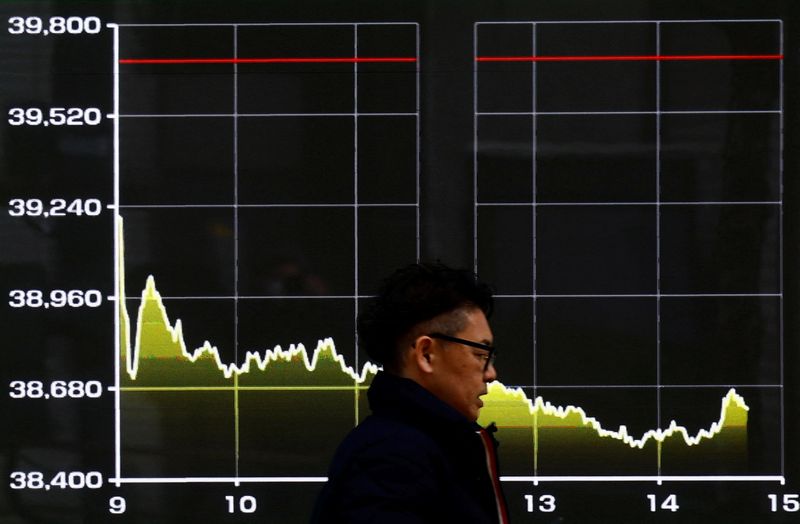By Jamie McGeever
(Reuters) - A look at the day ahead in Asian markets.
With global markets gently easing back from recent highs ahead of U.S. inflation data on Tuesday, Asian markets are unlikely to swing too far in either direction, although the Indian rupee and South Korean won could be exceptions to that rule.
Indian inflation and Bank of Korea meeting minutes top the regional economic calendar on Tuesday, which also includes Philippine trade and Malaysian industrial production figures, and Australian business confidence.
Japan's top financial diplomat Masato Kanda is scheduled to speak too and as one of the country's top voices on exchange rates, anything he says on the yen will be listened to attentively.
The yen has recovered from historically low levels recently, back in line with what Kanda and others might consider 'fundamentals' - it rose 2% against the dollar last week, its biggest rise since July.
This helped drive the Nikkei's 2.2% slide on Monday, its biggest loss since October. Having reached a record high above 40,000 points last week, Japan's benchmark index was always vulnerable to a correction.
That may have more to run as speculation intensifies that the Bank of Japan is about to make a landmark shift away from its ultra-loose policy. The BOJ said it made no purchases of exchange-traded funds on Monday despite the slide in Japanese stocks, stoking that speculation even further.
The broader correction in Asian equities on Monday was much shallower, however, thanks to a solid rise in China, and Wall Street's decline was mild too. That said, the Nasdaq was again the biggest decliner of the three major U.S. indices, and after sliding 5.5% on Friday market darling Nvidia (NASDAQ:NVDA) fell another 2%.
Is risk appetite beginning to crumble? Perhaps, although bitcoin smashing through $70,000 to a record high $72,910 on Monday would suggest otherwise.
In China, authorities have asked banks to enhance financing support for state-backed China Vanke and called on creditors to consider private debt maturity extension, in a rare intervention from central government to help an embattled property firm.
There's a long way to go but this news, exclusively reported by Reuters, could help bolster confidence that the property sector crisis has reached its nadir.
Elsewhere in Asia on Tuesday, Indian inflation figures are expected to show annual inflation cooled in February to a four-month low of 5.0%. Despite the easing, inflation has remained above the 4% mid-point of the central bank's tolerance band of 2%-6% since September 2019.
The rupee has been one of Asia's best-performing currencies this year, but from a low base - it is still languishing near its weakest ever levels against the dollar.
Here are key developments that could provide more direction to markets on Tuesday:
- India consumer inflation (February)

- Bank of Korea minutes
- U.S. consumer inflation (February)
(By Jamie McGeever)